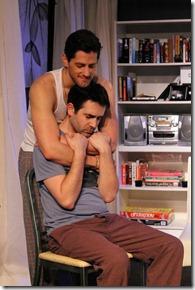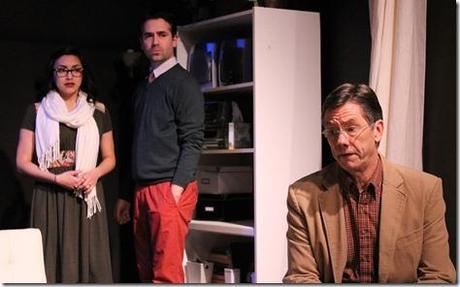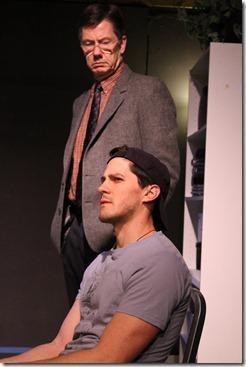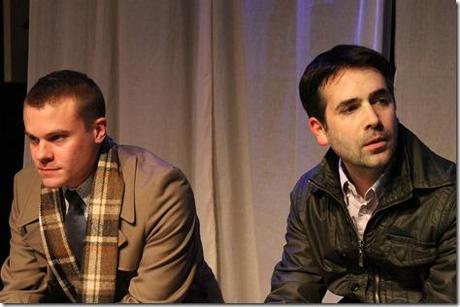
Next Fall
Written by Geoffrey Nauffts
Directed by Derek Bertelsen
at Heartland Studio, 7016 N. Glenwood (map)
thru May 25 | tickets: $20 | more info
Check for half-price tickets
Read entire review
Sincere attempt at a thoughtful play falls short

AstonRep Theatre Company presents
Next Fall
Review by John Olson
This play opened in New York off-Broadway in the summer of 2009 and, with the help of no less than Sir Elton John and his partner David Furnish, transferred to Broadway the following spring. There, it was critically well-received and became one of the four Tony Award nominees for Best Play. Indeed, it’s a heartfelt play with the worthy theme – little explored in dramatic literature – of a gay person’s internal conflict between their orientation and their firmly held religious beliefs that homosexuality is a sin. It’s a problematic play, though. Some of the characters’ motivations are unclear or illogical, although this may have been less of a problem in the hands of more experienced actors than this production possesses. Geoffrey Nauffts script requires convincing naturalistic acting to put the story across and to flesh out characters which he has admirably written to avoid easy stereotypes. This cast, for the most part, isn’t quite up to that challenge.

Nauffts draws Adam and Luke well enough as everyday recognizable urban gay men, mostly avoiding the sorts of stereotypical references that writers often fall back upon. Ryan Hamlin as Adam has the largest role and is the most convincing of the cast, giving him a Will Truman-like sensibility and self-deprecating sense of humor and insecurity. Mark Jacob Chaitin is energetic and upbeat as the younger Luke, though he plays him with a slight effeminacy that would be enough to arouse suspicion of a gay orientation among all but the most self-delusional parents.
It’s with the secondary characters that Nauffts, director Derek Bertelsen and this cast have more trouble. While Nauffts should be lauded for refraining from stereotype in creating Butch, he replaces these clichés with a bundle of contradictions. Butch and his first wife Arlene, Luke’s mom, were once wild free-spirits. Butch is now married to a second wife and born again. That’s fair enough, but does it seem logical Butch would have acquired new prejudices with his new faith? And, it’s revealed Butch in the past had worked with a gay art dealer and thus had had at least some exposure to gay people on a personal level. The sort of unyielding bigotry Butch is shown to have doesn’t seem logical. Is it perhaps internal homophobia? Possible, but Nauffts doesn’t make that suggestion. As Butch, Jim Morley, understandably given the script, doesn’t seem to quite know what to do with his character. It’s not clear exactly how kind or cruel Butch is meant to be. Luke’s mother Arlene is shown to have taken longer to settle down, and her portrayal here by Lona Livingston is frequently entertaining. But, does it make sense that Luke would have kept his orientation secret from his mother who most likely would have been more accepting of it? It’s shown that Arlene has had little contact with the family, so there’s no reason to fear the word would get from her to Butch. Nauffts leaves these questions unanswered and Livingston does little to fill in those blanks by providing a different and clearer reaction to the news of Luke’s orientation.
The remaining characters are the friends Holly – described in one scene as fat, though the actress (Aja Wiltshire) is not – and the taciturn Brandon. Holly has little function in the play and risks being, through no fault of Wiltshire’s, a stereotypical gay gal pal. Brandon (Curtis Jackson) is simply enigmatic until he is shown to have his own brand of religion-based internal homophobia late in the play. There’s really very little for Jackson to do with his character.
In general, Bertelsen’s cast has a hard time making Naufft’s naturalistic script feel organic. They’re mostly unable to develop varied cadences that distinguish between lines meant to be mundane and tossed off versus those that convey important information. They don’t add information beyond what Nauffts has given them on the page and further define their characters through physicality or vocal inflexion. This seems to be the hardest part of acting, particularly with such a realistic script and intimate staging. The ability to move beyond simply providing logical readings of the playwright’s lines, using them as only a starting point for creating characters, is what most distinguishes professionals from non-professionals. In this regard, this cast is below most of the professional non-Equity companies I’ve seen in this city.
Most of the play’s action occurs either in the hospital waiting room or the couple’s apartment. Jeremiah Barr’s unit set does double duty as both and it’s initially confusing where we are at times. Barr and Robert Tobin have also created some ambitious video projections of Luke and Adam on the streets of Manhattan that are unnecessary and hard to read on the curtain that was awkwardly pulled across the stage between scenes. Allison Smith’s costumes are appropriate of the characters, though they included an odd pair of maroon slacks for Adam.
There’s no questioning the sincerity and commitment of this company to a piece that, despite the distracting confusions in its secondary characters, is an intelligent examination of some of the unique challenges gay men and lesbians face in fully integrating all their relationships. You may want to see it for that reason, and by later in the run, it’s possible the cast may have fallen more deeply into their characters.
Rating: ★★
Next Fall continues through May 25th at Heartland Studio, 7016 N. Glenwood (map), with performances Thursdays-Saturdays at 8pm, Sundays 2pm. Tickets are $20, and are available by phone (773-828-9129) or online through BrownPaperTickets.com (check for half-price tickets at Goldstar.com). More information at AstonRep.com. (Running time: 2 hours 20 minutes, includes an intermission)

Photos by Jeremiah Barr
artists
cast
Mark Jacob Chaitin (Luke), Ryan Hamlin (Adam), Curtis Jackson (Brandon), Lona Livingston (Arlene), Jim Morley (Butch), Aja Wiltshire (Holly).
behind the scenes
Derek Bertelsen (director), Jeremiah Barr (producing director, scenic design, projection design, photos), Samantha Barr (lighting design, stage manager), Alexandra Bennett (dramaturg), Amanda Lautermilch (assistant director), Danielle Moore (assistant stage manager), Allison Smith (costume design), Lisa Tobin (props, graphic design, house and box management), Robert Tobin (artistic director, projection design).
13-0460

